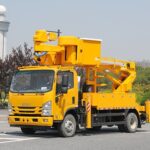A lammutusauto, also known as a road wrecker, possesses various functions such as hoisting, pulling, and towing. Its primary use is to clear malfunctioning vehicles on the road, manage illegally parked vehicles in cities, and assist in emergency rescues. With the development of the economy in our country, the demand for lammutusautos is increasing, and more people are purchasing them. Today, let us delve into some knowledge about wrecker trucks—specifically, the leaf spring.
The Role of Leaf Springs in Wrecker Trucks
In lammutusautos, the leaf spring plays a crucial role in providing stability and shock absorption. These springs are generally designed based on the vehicle’s rated load capacity. The leaf spring assembly typically consists of multiple layers of steel strips, known as leaves, that are bound together and act as a single unit.
Importance of Load Capacity
- Rated Load Capacity: The leaf springs are engineered to support a specific load capacity. If the actual load significantly exceeds this rated capacity, the springs will undergo excessive bending. This overstressing severely reduces their fatigue strength, leading to premature damage and failure.
- Exceeding Load Limits: When the load is too heavy, the excessive bending and stress on the leaf springs can cause them to lose their elasticity and eventually break. It is crucial to adhere to the vehicle’s load ratings to maintain optimal performance and longevity.
Driving Conditions and Their Impact
- Poor Road Conditions: Driving at high speeds on rough roads increases the deformation amplitude and frequency of the leaf springs. This accelerates fatigue and results in quicker wear and tear. To prolong the lifespan of the leaf springs, it is advisable to maintain an economic speed and reduce speed on uneven terrains.
- Emergency Braking: Sudden stops due to emergency braking exert excessive bending and tensile stress on the leaf springs. The rapid deceleration causes the springs to endure high-stress levels, which, if they exceed permissible limits, can lead to fractures.
- High-Speed Cornering: Taking turns at high speeds generates significant centrifugal force, placing an increased load on the outer springs. This additional stress accelerates wear and tear, making it essential to slow down when turning to extend the lifespan of the leaf springs.
Maintenance and Checks
- Regular Inspections: If the U-bolts or center bolts of the leaf springs become loose, the load on the main spring leaf increases, making it prone to damage. Regular checks and timely maintenance of bolt tightness are crucial to prevent undue stress and potential damage.
- Proper Maintenance: Ensure that the leaf springs are properly lubricated and free from rust or corrosion. Regularly inspect for any signs of wear, cracks, or breaks, and replace damaged springs promptly to avoid further issues.
Järeldus
Understanding the importance and maintenance of leaf springs in lammutusautos is essential for ensuring the vehicle’s longevity and optimal performance. Proper load management, mindful driving practices, and regular maintenance checks can significantly extend the lifespan of the leaf springs, enhancing the overall safety and efficiency of the lammutusauto.
For more information about lammutusautos and their components, visit Specialty Vehicle Network!












